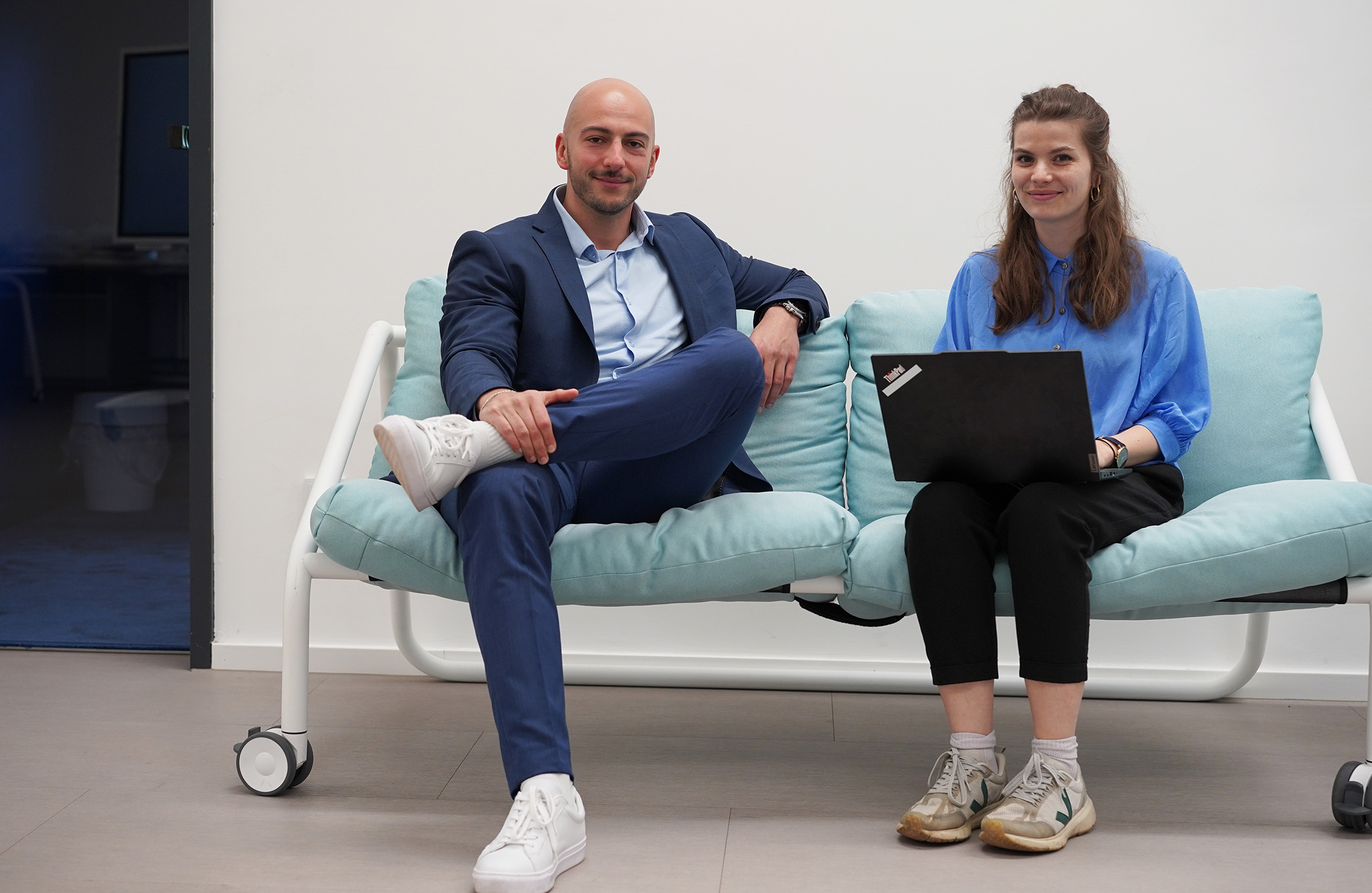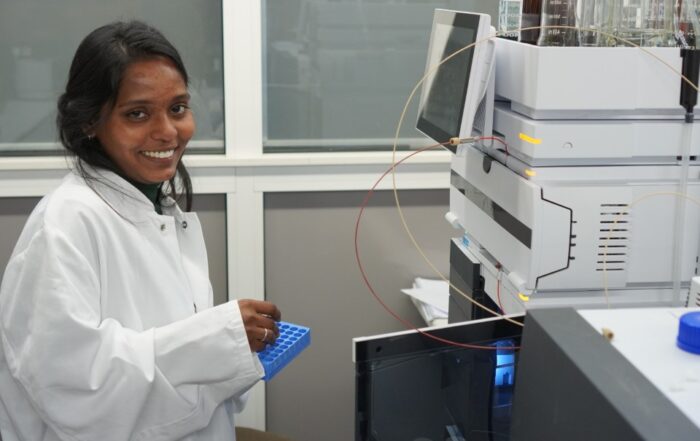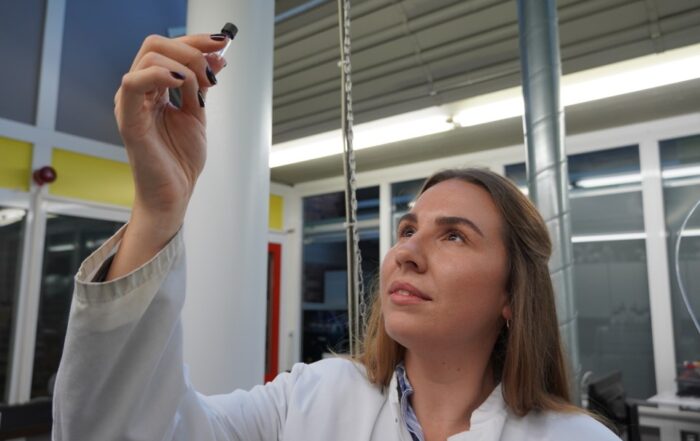29. April '24
Elena Friedel and Thomas Nick are new to the Transfer & Entrepreneurship department at Coburg University of Applied Sciences.
As Coach Entrepreneurship Education and Coordinator Start-up Support, they have been completing the Cooperation and Start-up department since April.
In this interview, they talk about their activities and goals.
Elena Friedel, what are your tasks as an Entrepreneurship Education Coach?
Elena Friedel: My focus is on supervising and supporting the “
The aim of the project is to provide an annual cycle of entrepreneurial training for those interested in setting up a business, to network them with each other and, above all, with regional partners and innovative companies, and ultimately to get successful start-ups off the ground.
I accompany students who have a start-up idea and register for the program, ideally until the start-up is founded.
I also design and develop start-up-related courses.
At the same time, I build on existing projects and offerings at the university and support lecturers in establishing a link to the topic in their teaching formats.
In doing so, I also build on the courses and projects that already exist at our university.
And Thomas Nick: What does a typical working day as Coordinator for Start-up Support look like?
Thomas Nick: I’m currently doing a lot of analysis and sorting out what start-up support options Coburg University of Applied Sciences already offers – for example, the Entrepreneurship Track for Regional Impact on Global Challenges(ERIC) project, the faculties’ start-up officers or the FTC, but also external network partners in Coburg, such as the Coburg start-up network.
From this, I would like to find out what is still missing and what we can still offer.
An ideal working day looks like this for me: In the morning, a team interested in setting up a business comes to see me, which I have been supporting in their start-up project for a while.
As the team is preparing for a start-up pitch, we go through the documents together and practise the pitch together.
In the afternoon, I research external funding programs and offers to provide our students with additional help on their startup journey.
In the evening, I represent Coburg University of Applied Sciences at a networking event on the topic of start-ups.
Why did you apply for the advertised positions?
Elena Friedel: I am enthusiastic about promoting ideas of all kinds.
I really enjoy supporting students.
And because GO! is a project that can still be filled, I can give free rein to my creativity when developing formats.
At the same time, there are already exciting projects and offers.
Thomas: I have always been interested in entrepreneurship and self-employment and was able to gain my first experience during and after my Master’s degree.
In my position, I have the opportunity to contribute my experience and knowledge to my home university in order to build something great together with our team.
As Elena has already said, we have a playground here where we can prove ourselves creatively.
What has become of the start-up, Thoma Nick?
To what extent can the experience and knowledge from that time help you in your current job?
Thomas Nick: I studied Entrepreneurship and Management in the Principality of Liechtenstein.
The course was designed so that you develop a business idea during your studies, ideally found a company and work on your start-up.
My team and I seized the opportunity and worked on our project for a year and a half – we attended pitch fairs, raised capital and went through a start-up accelerator, among other things.
We found a carbon nanotechnology patent from the Frauenhofer Institute, optimized the technology and developed new applications.
After a year and a half, we split up as a team and realized that we didn’t want to take the next big step.
As I went through the start-up process myself, I can pass on my experience to the students and assess what they might need in which phase of the start-up.
Elena Friedel, what points of contact did you have with the topic of start-ups?
Elena Friedel: My partner founded a company a few years ago.
So I had a lot of insight into the start-up process and the first few years of a company.
I also work at the University of Bamberg in teacher training, where I work intensively on the topic of the school of the future.
Schools are currently facing many challenges – in terms of content, structure and with regard to digitalization, differentiation and the shortage of teachers.
This gave rise to the idea of supporting schools in the transformation process.
However, I am currently still in the idea-finding and concretization phase.
Our activities will initially run until the end of 2027.
What do you want to achieve by then?
Elena Friedel: I hope that we have created a place that raises awareness of the topic of start-ups and brings together exciting formats.
At the same time, I hope that we are a point of contact for all those interested in founding a company from all faculties.
Students and lecturers who think they have nothing to do with the topic should also contact us and we can then look together at what is possible.
For the “GO!” project, I hope that I have accompanied many students on their way – ideally together with Thomas until the company is founded.
I particularly hope to reach women, people with disabilities or with family commitments – statistically speaking, they are still particularly unlikely to start a business.
Thomas Nick: My goal is to have created a service structure and a network that opens up all paths for people interested in starting a business, from students to university staff and lecturers.
When I look back in three years, I would like to see more university-related start-ups.
I would like the university to be described by the words innovation, culture and entrepreneurship.
I would also like to see entrepreneurship as an interdisciplinary elective subject for Bachelor’s and Master’s degree courses.
In this way, successful, heterogeneous start-up teams can be created and the necessary skillset can be taught at an early stage.






